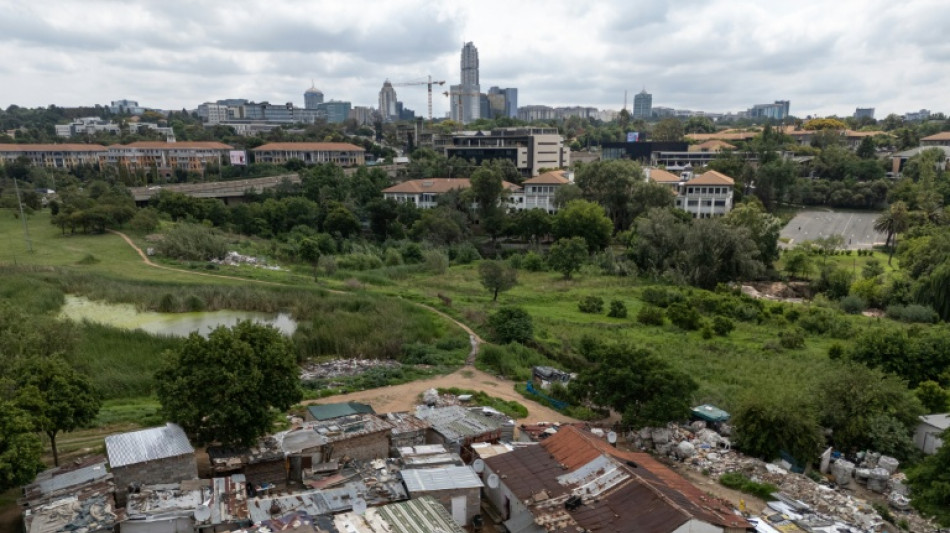
-
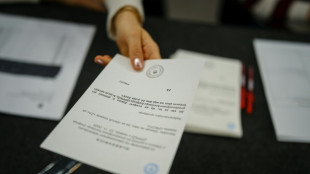 Slovenia holds crunch vote on contested assisted dying law
Slovenia holds crunch vote on contested assisted dying law
-
Aonishiki beomes first Ukrainian to win sumo tournament
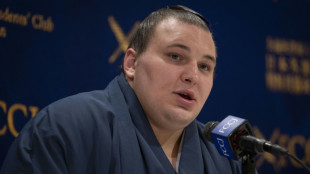
-
 Holders Australia drawn with New Zealand in Rugby League World Cup
Holders Australia drawn with New Zealand in Rugby League World Cup
-
Vietnam flooding kills at least 90
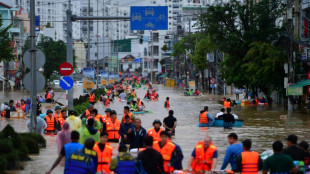
-
 Muthusamy's maiden Test century powers South Africa to 428-7
Muthusamy's maiden Test century powers South Africa to 428-7
-
Myanmar junta says nearly 1,600 foreigners arrested in scam hub raids

-
 US signals room for negotiation on Ukraine plan ahead of talks
US signals room for negotiation on Ukraine plan ahead of talks
-
Verstappen wins Las Vegas F1 Grand Prix, Norris edges closer to crown

-
 Muthusamy anchors South Africa to 316-6 in second India Test
Muthusamy anchors South Africa to 316-6 in second India Test
-
Vietnam flood death toll rises to 90

-
 US denies pushing Russian 'wish list' as Ukraine plan
US denies pushing Russian 'wish list' as Ukraine plan
-
Harden's 55 leads Clippers win as Pistons streak hits 12

-
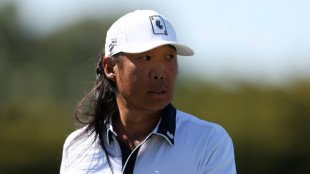 Kim's first top-10 in 14 years as Ballester wins maiden pro title
Kim's first top-10 in 14 years as Ballester wins maiden pro title
-
Gotham crowned NWSL champions after Lavelle breaks Spirit

-
 Trump signals room for negotiation on Ukraine plan ahead of talks
Trump signals room for negotiation on Ukraine plan ahead of talks
-
Head shapes up as solution for Australia's opening woes
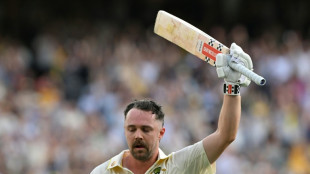
-
 Tomorrowland bets on Chinese dance music fans with first indoor event
Tomorrowland bets on Chinese dance music fans with first indoor event
-
England slammed as 'brainless' after first Ashes Test capitulation
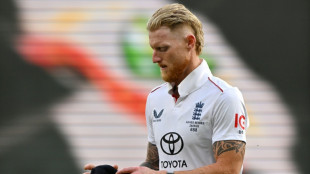
-
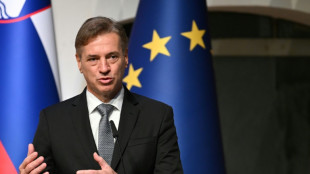 Slovenia to hold new vote on contested assisted dying law
Slovenia to hold new vote on contested assisted dying law
-
'Beer tastes better' for Eramsus after win over Irish
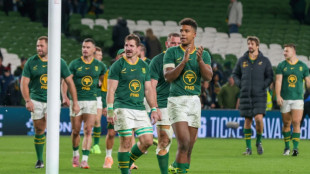
-
 No.1 Jeeno leads by six at LPGA Tour Championship
No.1 Jeeno leads by six at LPGA Tour Championship
-
Neres double fires Napoli top in Italy

-
 Bielle-Biarrey masterclass helps France hold off Australia
Bielle-Biarrey masterclass helps France hold off Australia
-
Pogba returns in Monaco loss as PSG stay top in France
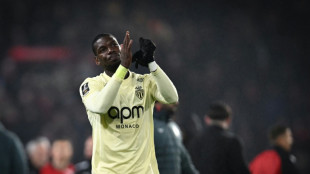
-
 COP30: Key reactions to climate deal
COP30: Key reactions to climate deal
-
What did countries agree to at COP30?

-
 Harden's club-record 55 points leads Clippers over Hornets
Harden's club-record 55 points leads Clippers over Hornets
-
Amazon climate deal a 'win' for global unity but fossil fuels untouched

-
 Boos, blowups and last-minute pause as a chaotic COP30 closes out
Boos, blowups and last-minute pause as a chaotic COP30 closes out
-
Farrell proud of Ireland after 'mad' Test with South Africa

-
 Gaza civil defence says 21 killed in Israeli strikes
Gaza civil defence says 21 killed in Israeli strikes
-
South Africa beat ill-disciplined Irish to end Dublin drought

-
 South Africa's Marx named World Rugby player of the year
South Africa's Marx named World Rugby player of the year
-
Ukraine, US head for talks on Trump's plan to end war

-
 Newcastle dent Man City's title bid thanks to Barnes double
Newcastle dent Man City's title bid thanks to Barnes double
-
Brazil's Bolsonaro detained for trying to break ankle bracelet and flee
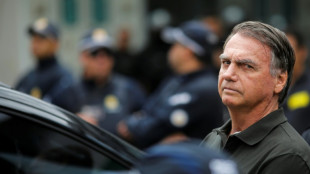
-
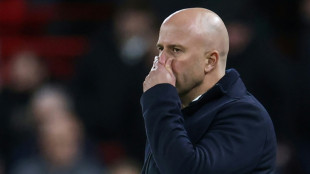 Slot takes blame after Liverpool stunned by Forest
Slot takes blame after Liverpool stunned by Forest
-
Lampard hails 'outstanding' Coventry after comeback win over West Brom

-
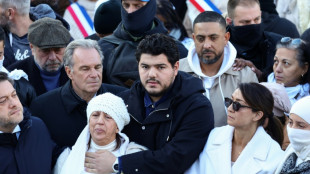 Thousands rally in France after murder linked to anti-drug activism
Thousands rally in France after murder linked to anti-drug activism
-
Geopolitical fractures and Ukraine worries sap G20 summit
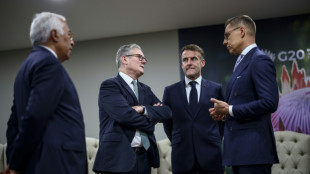
-
 Robertson praises reshuffled All Blacks after Wales mauling
Robertson praises reshuffled All Blacks after Wales mauling
-
Spain to face Italy in Davis Cup final

-
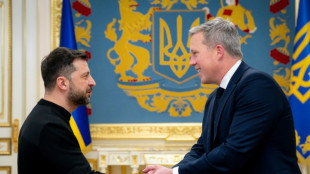 Ukraine, US to hold Geneva talks on Trump's plan to end war
Ukraine, US to hold Geneva talks on Trump's plan to end war
-
Lewandowski will remember scoring first goal at new Camp Nou 'forever'

-
 Thousands march in France to demand action on violence against women
Thousands march in France to demand action on violence against women
-
S.Africa G20 declaration highlights: minerals, debt, climate
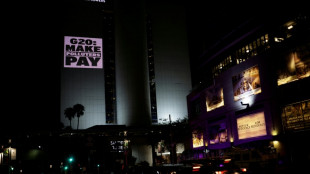
-
 Barca thrash Athletic to inaugurate rebuilt Camp Nou in style
Barca thrash Athletic to inaugurate rebuilt Camp Nou in style
-
Forest beat Liverpool to add to English champions' woes

-
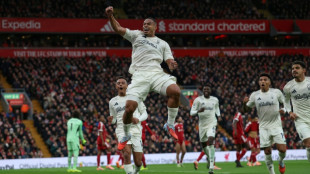 Liverpool stunned by Forest, Chelsea boost title charge
Liverpool stunned by Forest, Chelsea boost title charge
-
McKenzie guides New Zealand to another win over Wales
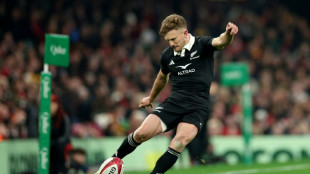

Unequal South Africa seeks to tackle inequality as its G20 'legacy'
From the scrappy metal shacks packed tightly on the banks of the thin Jukskei river, the sparkly skyline of Johannesburg's richest neighbourhood less than two miles away was another world.
Bags of refuse for sale to recycling companies lined a muddy path to a vegetable garden tended by residents of the informal settlement at the foot of the high-rises of Sandton, South Africa's economic hub.
A light powered by a makeshift electrical connection shone at the doorway of the rusted shack where Bryan lived with his wife and nine-year-old son.
"Here in Sandton, there are a lot of people and companies that have money," said the 34-year-old security guard, who would only give his first name for fear of losing his job.
But, "we don't have access", he said with a shrug, a cigarette in his hand.
The backdrop of skyscrapers and shiny office towers was a stark reminder of the gulf separating rich and poor in South Africa, which the World Bank ranks as the most unequal country on the planet.
- 'We need it the most' -
With leaders from the Group of 20 of the world's most powerful economies convening in Johannesburg this weekend, President Cyril Ramaphosa has made the fight against inequality a priority for the summit and pushed for it to be a "legacy" of the first African-hosted G20.
He appointed an expert task force led by Nobel Prize-winning economist Joseph Stiglitz to report to the summit and put his weight behind its recommendation to create a panel to tackle extreme wealth disparities and modelled on the UN's Intergovernmental Panel on Climate Change (IPCC).
"South Africa is owning up to its status as the most unequal country in the world and is keen to use the springboard of the G20 to tackle that," said Isobel Frye, G20 senior policy adviser at Oxfam.
"The fact that it is something that South Africa owns and claims, in a way, gives it greater impetus," she told AFP.
The Stiglitz report found that the world's richest one percent captured 41 percent of all new wealth between 2000 and 2024.
In contrast, just one percent went to the poorest 50 percent, it said.
In South Africa, according to the University of Witwatersrand, the top 0.1 percent owned over a quarter of wealth.
Frye said this was a legacy of colonialism and apartheid.
Unemployment of nearly 32 percent and extreme wage inequality further drove the disparity, she said, with almost one in four households depending on government grants of R500 ($29) a month as their main source of income.
The bus fare to the public school where Bryan sends his son -- in Alexandra, one of Johannesburg's roughest townships -- is about R400 per month ($23).
Just a stone's throw away in Sandton, fees for private schools exceed $10,000 a year.
Bryan hoped his son would one day find a job better than that of his own grandfather, a farmworker, and his father, a gardener.
- 'Opt out'-
Standing out in the business district towering over Bryan's shack is a grandiose, oval-shaped tower called The Marc, its black-and-gold facade reflecting the sunlight.
Inside were luxury shops and restaurants, and an advertising board proclaiming that the entire street was powered by the building's generator, ensuring patrons would "never be left in the dark" by South Africa's patchy electricity supply.
The informal settlement where Bryan lived with his family was not visible from the golden building and had none of these services.
Residents had pooled money to build a shared toilet, he said. "We do everything ourselves."
Asked about the looming G20 summit, he said: "The billionaires that are coming here, I don't think they will do something better for us."
According to Frye, tackling inequalities was essential to ensure the good functioning of democracy.
"If the rich are not taxed fairly, they opt out of democracy," she said.
"We can see that in South Africa: you buy your medical aid, your private education, your security," Frye said. "And so it doesn't matter to you, because you're not part of the system."
V.AbuAwwad--SF-PST

